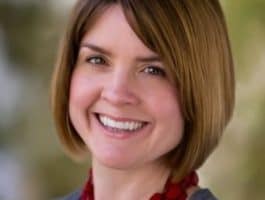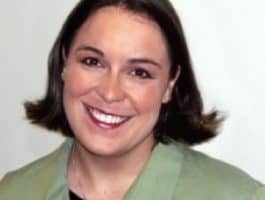
The Emotional Hurdles of Living Through a Divorce
Divorce not only dramatically affects the couple involved, but also their children. That's according to authors Elizabeth Marquardt and Jen Abbas, both adult children of divorce. Elizabeth and Jen talk about the emotional reality of divorce for children.
Show Notes
About the Guest
-
Divorce not only dramatically affects the couple involved, but also their children. That's according to authors Elizabeth Marquardt and Jen Abbas, both adult children of divorce. Elizabeth and Jen talk about the emotional reality of divorce for children.
-

Elizabeth Marquardt
Elizabeth Marquardt is the director of the Center for Marriage and Families at the Institute for American Values, a nonpartisan think tank focused on children, families, and civil society. Her essays and op-ed pieces have appeared in the New York Times, Washington Post, Chicago Tribune, and elsewhere. She lives in Chicago with her husband and two children.
Jen Abbas
Jen Abbas is an adult child of divorce who has dedicated herself to discovering how children of divorce can change the patterns of their past.
Elizabeth Marquardt and Jen Abbas talk about the emotional reality of divorce for children.
The Emotional Hurdles of Living Through a Divorce
Bob: There are moments in the life of an individual, whose parents have been through a divorce, when a curtain is pulled back and you can see the scars that are still on that person's soul.
Man: There were many, many nights, when it was time for us to go to bed, my dad still was not home from work. My dad had already confessed to the adultery and all that. We all knew where he was. We knew he was with this woman.
Bob: This is FamilyLife Today for Tuesday, October 8th. Our host is the President of FamilyLife®, Dennis Rainey, and I'm Bob Lepine.
Man: And I would wake up at 1:00 or 2:00 in the night to these shrieks. They were shrieks of my mother sobbing and crying in her room because my dad still was not home. I would go in there and just sit with her. You know, I can still hear those cries. But my dad, because of his decisions, chose to drag his family through this hell for several years, basically, so that he could find pleasure in another woman. You know, it made no small impact on his children.
Bob: And welcome to FamilyLife Today. Thanks for joining us. You know, the movie that’s out in theaters this week called Adult Children of Divorce: A-C-O-D is a comedy. But you have to wonder how many young adults are walking around with that kind of emotional pain in their lives. Yet, we don't know it. We don't see it. It's just not obvious.
Dennis: I've said, for years, that if you had some way of measuring the emotional pain that has been created by this culture of divorce, it would be like a megaphone—a megaphone that—that one young man described his mom shrieking. I think there is an agony that is—a quiet agony that is occurring in the souls of adults today who grew up in broken homes.
I want to ask our guests on today's program, Elizabeth Marquardt and Jen Abbas, what you all thought about that young man's testimony. Jen, your parents divorced when you were 6—and again, when you were 18, you experienced divorce. What did you think about that?
Jen: Well, it was interesting because I identified—when I was 17, my mom was having an affair. It just brought back a lot of memories of my stepdad and I being in this house, and mom wasn't around. We knew that she wasn't being honest with us about where she was. Being 17, and about to be launched off to college, you know, this is a time where, from my perspective, my parents should really be here for me and helping me pick out colleges and giving me a safe launching pad. It was like my mom was already gone. The message that she sent me was: “It was more important for her to find what she wanted than to be there for me.”
Bob: You know, the young man we heard from, at the beginning of the program, reflected on that same theme. He talked about his dad being, fundamentally, caught up in what was, ultimately, selfishness; but he was caught up in his own world—his own circumstances—and he wasn't there for his son.
Man: During one of the times—when my dad had moved out of our house, and he was staying with his parents—and my sister had been over there visiting him and my grandparents. My mother hadn't heard from her—wondered: “Where is she? When's she coming home?” So, I drove over to get her.
Just for some reason—just seeing my dad there—just the weight of the separation and all that just overwhelmed me. When Dad came out, you know, to tell me goodbye—we were getting in the car. He came out to tell me goodbye. I just started weeping bitterly, and hugging him, and said: "Dad, please come home. Please come home."
I remember my grandmother and my grandfather coming out on the porch, and watching all this, and watching me just sobbing, as a 17-year-old boy. My grandmother said, "Do you not see what you're doing to your children?"
Dennis: Elizabeth, you experienced divorce multiple times growing up—at the age of 2, again at 9, 13, and 22. What were you thinking as you listened to that man talk about weeping bitterly. I was watching your face, and your head kind of dropped. You're bound to have heard that story time and time again as you've interviewed people, all across the nation.
Elizabeth: I have. We've both talked to so many grown children of divorce. The topic of infidelity comes up so often. It's not only an enormous struggle and pain for the children of divorce—just to see what it's doing to their other parent and what it does to them—but it's a huge moral issue for them and a huge stumbling block, often, in their faith journeys because, if they've spent any time around a church at all, they know they know the word "adultery". They know there's a commandment against it. Yet, their own parent has done this; and they see it—sometimes, it's their fathers have done it—sometimes, it's their mothers who have done it.
Frankly, there's a double standard here. They're devastated when their fathers are unfaithful, but they are just leveled flat when their mothers are unfaithful. One young man looked at me and he just said, "You don't want to think your mom's an adulterer." It really hurts them.
It hurts them—not only because of what they see it doing in their families and how it makes them question their faith—but also, they worry about that parent. One young woman, who was very strong in her faith, said to me that, growing up, she didn't worry so much about whether she could forgive her father; but she worried about whether he would be forgiven.
Dennis: Elizabeth, what were you thinking as you heard him talk—you personally?
Elizabeth: I'm trying to think back, now. I want to answer you as honestly as I can. I mean, I was—I'm moved when I hear young men sharing these stories of pain because you don't hear young men talking about this pain very much. You could think that, “Maybe, they don't feel it as much;” and they do. Of course, they do. Hearing that young guy—he sounds like a tough guy—a good guy, you know—breaking down and crying like that. You realize how much is there. It's just very moving.
Jen: I was going to say one thing that creates an additional kind of struggle is that—a lot of times, when it happens, especially, in the case where one parent leaves their spouse for this other person and they marry that person—then, all of a sudden, you have this situation where you need to honor this person because they're your stepdad or your stepmom. So, this person who broke up your family life, as you know it—all of a sudden, you need to make nice with them or you are a disobedient little kid. As a kid, you don't have the emotional ability to really say: "Wait! This is wrong! Mom, you're wrong," because, you know, “Mom's the boss.”
Bob: And you stop and think about the emotional impact of that—but then, beyond that to ask: “What does that do to how a child processes moral, and spiritual, and ethical categories?” I mean, children are growing up, trying to make sense of the world and morality—they're trying to learn civilized behavior—we're trying to teach it to them. You throw something like this into the mix and, not only does it jumble up my feelings, but it messes up my thinking, too; doesn't it?
Elizabeth: It does. The children of divorce are handed a really big job. When parents are married, it's their job to do some of this work—this hard work of making sense of your different values, your different beliefs, your different backgrounds. When they get divorced, that job doesn't go away. It just gets handed to their child instead—who is 4, or 8, or 12 years old. Their child is, and always will be, throughout their childhood, looking to their mom and dad as the first and most important role models for their own moral and spiritual formation.
Now, these role models live completely separate lives—lives that, to a child, often seem to be polar opposites. When the child asks those big questions of moral and spiritual identity—“Who am I?” “Where do I belong?” “What is true?” “What is right and wrong?” “Is there a God?”—they're looking to two different models—that often seem as different as night and day—and those two people aren't talking about this kind of big stuff anymore. They're not fighting about it, they're not talking about it—nothing—but the child is wrestling with the differences that the child sees in each of their worlds.
That conflict, that used to be between the parents, has now gotten transferred to the child's inner life. It's within the child's own life—in a very lonely, overwhelming way—that the child is trying to confront these big questions. I think it's the distinctive experience of the child of divorce.
Bob: I remember reading a quote from a young girl—a teenage girl—who was a child of divorce. She said, "I wish my parents understood that for them to talk about God's love for me when they can't love each other," she said, "I can't deal with that on a cognitive level."
Dennis: Right.
Jen: Gary Thomas's book, Sacred Marriage, is the book that I, hands down, call the best book on marriage because it redeems the institution of marriage, in my mind. Before reading that book, I had no desire to be married because: “Why? I see what goes down that road. Why would I want to do that?” But reading the book—and the subtitle of the book, if you aren't familiar with it, is: What is the Purpose of Marriage? It's to make us holy more than happy—and really redeeming that idea that every aspect of marriage is a form—a spiritual formation and discipline that we, not only grow closer to God, but, also, we are demonstrating the character of God—or we're not demonstrating the character of God.
That's the big thing of: “How do you…”—what our parents, in our generation—what they were all told is: “When you're getting a divorce, you sit the kids down, and you tell them, ‘Mommy and Daddy—we can't get along anymore. So, we're going to get a divorce; but we still love you.’" What the child hears is that: "Mommy and Daddy once chose to be together. I just kind of came along. If they can choose not to love each other anymore, then they can choose not to love me if I'm not perfect,” or, “—if I'm not….” That's where you get into all of these coping mechanisms.
It takes a long time to kind of disassociate from that part that is so ingrained in your hardwiring—that love is fickle, and fleeting, and it's what you deserve. Then, when you go to church—and especially, for children, a lot of times, everything is simplified, you know, because you want kids to understand it and, you know, things like "Well, adultery is bad." Well, “Does that mean Mom was bad? Is Mom bad?” Then—
Bob: “What do I do with that?”
Jen: “What do I do with that?” or, you know, “God loves you and everything is going to be alright.” “Well, I don't feel everything is alright. Does that mean that God doesn't love me?”
Dennis: I've talked to adults, who have gone through divorce and have spent hours talking with them—interacting—as I watch them attempt to recover and pick up the pieces in their lives, and sort through all the emotions of what they were experiencing, trying to piece it together. I've often thought: “If an adult, who is emotionally-mature, supposedly, fully-developed, as an adult—everything is in place, you know, they're functioning in life—if they struggle trying to piece it all together and, sometimes, spend decades piecing together their own emotions and what they're thinking and feeling—how can we expect a 12-year-old, a 15-year-old, or, for that matter, and 18-year-old to process this emotional earthquake—that has aftershocks that go on into adulthood that—how do they even interpret it?”
For many of these young people today—who have gone to college, and they're out, and they've established their own marriages and families—would you say, Elizabeth—that most have not dealt with it? Most have just denied the divorce as a significant event and are moving on with their lives?
Elizabeth: I think there is a real defensiveness among many of us who are grown children of divorce who say, kind of: "I'm not damaged goods. I don't think of myself that way. I’m okay. I'm relatively successful, and I don't like this whole debate about children of divorce and, ‘How messed up do the children of divorce end up?’ because that's not me."
I understand that defensiveness. I think it really speaks to a weakness in our cultural debate about divorce because all we've wanted to know is: "Well, how messed up do the children of divorce end up?” and, “How many of them end up addicted, or in jail, or on the street, or killing themselves?" That's important; and more of them do end up with very serious problems like that, compared to those whose parents stay married.
But people who want to emphasize the upside of divorce—or to say that divorce isn't so bad—they say: "Well, the majority of children of divorce don't end up with those very serious problems. So, they're fine." That's really where I want to take on the culture. This idea that: “If children don't have seriously disabling, clear problems—if they're not just…” you know—
Bob: “If you're not in jail, you're fine.”
Elizabeth: “If you're not in jail, or pregnant at 14, or whatever, you're fine.”
Dennis: It really is being minimized today; isn't it?
Elizabeth: It's being minimized. Saying that they're fine does two things—one is that you just dismiss, in silence, the real struggles that they've gone through—and the other is that you send this powerful message that: “All we really care about is just setting and meeting a very low bar for children.” You know, “As long as they don't end up damaged, we've done our job.”
Well, as a society, that's inadequate. As parents, that's reprehensible. Obviously, none of us, as parents, want to say "All I want to do is prevent my child from being damaged. That's my biggest goal in life." To the contrary, as parents, we want our children to thrive. We don't want to just prevent the worst things from happening. We want them to have everything we can give them to have the most rich, fulfilling, productive life possible—to give back to others. We want them to know how to love and be loved.
It's not enough to just say: "Okay, well, how many of them end up in prison and that we need to worry about them?" and we do—we very much need to worry about them—but otherwise, “The others are fine.” We need to realize that the people who are visibly suffering are only the tip of the iceberg. There are a lot of us out there. We're not damaged goods. We don't think of ourselves that way; but our identities—who we are—are deeply shaped by our parents' divorce in ways that: “If you want to know us, and if you want to welcome us into your churches, and you want to have a lasting marriage with us, you need to know about that pain.”
Bob: And, you know, as you describe that, I'm thinking of folks in our audience—two groups of people. One group, that's sitting in conflict right now, going: "Well, yes, you're right. I want my child to grow up healthy and thriving. The environment my child is facing at home right now can't be producing that. I've got to do something to bring peace at home, if that's what I want for my child." That's one group.
There's another group—that's already gone through the divorce—and says: "You're basically telling me I have inflicted lifelong damage on my child. I might as well just crawl off the face of the earth right now because I've done irreparable damage to my son or daughter." Speak to both of those first.
Elizabeth: Let me start with that second one. I have tremendous sympathy for the situation that divorced parents find themselves in. For one thing, a lot of them didn't want the divorce. It was done to them. For another, life is complex. All of us fall short before God. I've made mistakes in my life, and we all have. I do not judge divorced parents. I think they're coming along in a very difficult culture at a very difficult time. I do feel that divorced parents—even if they already are divorced—can do a lot to help their child if they understand their child's inner world better. Books like mine—books like Jen's, others—I think can help them to do that.
With regard to the parents, who are listening and who are saying: "I want my child to thrive. My home does not produce an environment for a thriving child right now. There's a lot of conflict. It could even be dangerous. I'm worried.” My heart goes out to them. I do not think divorce is wrong in all cases. I think it's a vital option for ending very bad marriages, and I'm glad we have it.
It's a hard road. Even if you have a bad marriage, it's a hard road to end it through divorce. You're still going to have to deal with that person. You're still going to need a lot of help. I encourage you to reach out to your church and to great places, like this, to get that help.
What people need to know is that the majority of divorces today do not end high-conflict marriages. Two-thirds of divorces today end low-conflict marriages. They are ending marriages that are not characterized by abuse, or violence, or very serious and frequent quarreling. They're ending marriages that are often ending for reasons like people grew apart. They're not sure if they love each other anymore. Somebody else at work is more interesting.
Sometimes, they're ending for reasons that can be—as adults, we can be sympathetic for the kind of reasons adults are—you know, the people in the marriage are hurting. But a lot of this stuff is not on the radar screen to the child. You know—the idea of: "Okay, my parents are happy; but are they as happy as they could be? Would they be happier not married to my mom or dad? Are they as fulfilled as they could be?” You know, “Are they bored sometimes?" This is not on the kid's radar screen. What's on their radar screen is the day their parents come to them and tell them they're getting a divorce. That's when that child's world falls apart.
My message to people, based on my own experience as a child of divorce and all the people I've talked to, is: “If you're married to someone who you know is a good person and a good parent, and you're not sure you're in love anymore—you feel like you're growing apart—there are so many good reasons to reach out, and get help, and save that marriage for your child and for your own sake, as well.
Dennis: I have two points I want to make about that, Elizabeth. First, you write in your book that this divorce is the most devastating of all for the child in the low-conflict marriage—
Elizabeth: Right.
Dennis: —because they don't see it coming.
Elizabeth: It doesn't rescue them from anything.
Dennis: It's a blind side.
Elizabeth: Right.
Dennis: It's like their home blows up for no reason. And so they can't even piece together the consequences of what brought them to this point. But the second thing is, and I just want to affirm what you're saying here—there are so many marriages today—and I think it's because of our culture—we've created a myth of what the happy home looks like. Marriages are like people—they get isolated. They get isolated from other marriages. They get isolated from people who can bring health to them, and hope, and healing, and encouragement. This is where the Christian community—the spiritual community of faith—need to be offering solutions.
And it's why FamilyLife, as an organization, was founded in 1976—that was to equip couples, who are starting out their marriages together—to get the tools to know how to keep love alive, to know how to resolve conflict, to know how to better understand one another sexually, to know how to fulfill your role as a husband and what that role looks like, even if you didn't have that role and role model, growing up. We can give you a picture of that, from the Scriptures, that work—or of being a wife and a mom.
I think what we have is a great need today that must be addressed, at the soul level, among adults. What couples dare not do is toss the towel in too early because they may be pronouncing the benediction on a marriage and proclaiming it dead when all it needed was just a weekend away to be able to strengthen it and provide some help and hope.
Bob: We have seen couples, in that situation, who have come to a Weekend to Remember® getaway. We host these in cities, all across the country; and they have found exactly what you're talking about. They've found some practical help for their marriage—some skills they didn’t have before. They've regained a sense of hope. A lot of these couples were in a marriage that was headed for divorce; and now, that marriage is headed in a different direction. And we get to talk to them 10 or 15 years later. A lot of them tell us, “This was a turning point for us.” Then, we meet the kids who are there because Mom and Dad stayed together.
And I would just encourage our listeners, go to our website at FamilyLifeToday.com and find out more about the Weekend to Remember getaway. We host these, again, in cities, all across the country. We’d love to have you join us. You don’t have to wait until your marriage is desperate to join us for a Weekend to Remember. In fact, most of the folks who are coming are coming to do preventive maintenance on their marriage relationship.
So, again, go to FamilyLifeToday.com to find out more about the Weekend to Remember marriage getaway and to find out more about the book that Elizabeth Marquardt has written called Between Two Worlds—that talks about the reality that many adult children of divorce face—some of the emotional issues that are present when Mom and Dad divorce, even after the kids are raised and out of the house. You can find out more at FamilyLifeToday.com. Order a copy of the book from us online. Or call to order the book at 1-800-FL-TODAY: 1-800-“F” as in family, “L” as in life, and then, the word, “TODAY”.
You know, we very much appreciate those of you who listen regularly to FamilyLife Today. In fact, earlier today, I had a chance to meet a couple of our FamilyLife Today Legacy Partners—a couple who live out in Southern California. I think they live in Acton. They were in Little Rock, and they stopped by to take the tour and to tell us how God has been using FamilyLife Today in their lives, and how, over the last 15 years, it’s made a difference in their marriage and in what they’re pursuing.
So, it’s always great to connect with folks who are partners with us in this ministry—folks who share the passion and vision we have to see every home become a godly home. That’s our mission. We appreciate those of you who support the ministry and invest in that vision, as well, whether you’re Legacy Partners or when you make a donation on an occasional basis. We are grateful for your financial support.
This week, if you’re able to help with a donation, we’d like to send you a copy of Jennie Allen’s book, Anything. It’s about the prayer she prayed that—well, she said it rocked her world. We’d love to send you that book as our way of saying, “Thank you for your support.” Go to FamilyLifeToday.com. Click the button that says, “I CARE”, to make an online donation. Or call 1-800-FL-TODAY. Make your donation over the phone. Ask for a copy of the book, Anything, when you call to make a donation. Or request the book and write to us. Our mailing address is: FamilyLife Today, PO Box 7111; Little Rock, AR, 72223. And again, thanks for all you do in supporting this ministry. We appreciate your partnership with us very much.
We want to encourage you to be back with us again tomorrow when we’re going to talk about how adult children, whose parents divorced, can come to a place where they can forgive Mom and Dad for what happened in their lives. I hope you’ll tune in for that.
I want to thank our engineer today, Keith Lynch, and our entire broadcast production team. On behalf of our host, Dennis Rainey, I'm Bob Lepine. We'll see you back next time for another edition of FamilyLife Today.
FamilyLife Today is a production of FamilyLife of Little Rock, Arkansas.
Help for today. Hope for tomorrow.
We are so happy to provide these transcripts to you. However, there is a cost to produce them for our website. If you’ve benefited from the broadcast transcripts, would you consider donating today to help defray the costs?
Copyright © 2013 FamilyLife. All rights reserved.
1
Episodes in this Series

Approaching Marriage


